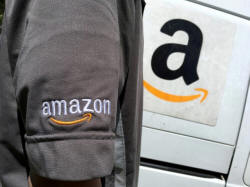Orlando ends facial recognition program with Amazon
 Send a link to a friend
Send a link to a friend
 [June 26, 2018]
(Reuters) - Orlando has
stopped testing Amazon's facial recognition program after rights groups
raised concerns that the service could be used in ways that could
violate civil liberties. [June 26, 2018]
(Reuters) - Orlando has
stopped testing Amazon's facial recognition program after rights groups
raised concerns that the service could be used in ways that could
violate civil liberties.
The Florida city ended a pilot program last week after its contract with
Amazon.com Inc to use its Rekognition service expired, news media
reported on Monday.
"Partnering with innovative companies to test new technology – while
also ensuring we uphold privacy laws and in no way violate the rights of
others – is critical to us as we work to further keep our community
safe,” the city and the Orlando Police Department said in a joint
statement provided to Floridapolitics.com on Monday.

Amazon could not immediately be reached for comment.
Orlando was one of several U.S. jurisdictions that Amazon has pitched
its service to since unveiling it in late 2016 as a way to detect
offensive content and secure public safety.
Last month, more than 40 civil rights groups sent a letter to Amazon
Chief Executive Officer Jeff Bezos saying technology from the company’s
cloud computing unit was ripe for abuse. The letter underscored how new
tools for identifying and tracking people could be used to empower
surveillance states.
On Monday, the Florida chapter of the American Civil Liberties Union
sent a similar letter to city leaders, saying that people "should be
free to walk down the street without being watched by the government".
During the pilot program, Orlando did not use the technology in an
investigation and did not use any photographs of members of the public,
Police Sergeant Eduardo Bernal told the USA Today newspaper.
[to top of second column] |

An Amazon.com Inc driver stands next to an Amazon delivery truck in
Los Angeles, California, U.S., May 21, 2016. REUTERS/Lucy
Nicholson/File Photo

The power of the technology has been on display in Oregon, where law enforcement
uploaded 300,000 mug shots dating to 2001 into Amazon’s cloud and indexed them
in Rekognition, according to an Amazon blog post.
Rekognition identified four faces with more than 80 percent similarity to an
image of an unidentified hardware store thief; a Facebook search subsequently
helped with the case, the post said.
Amazon said it requires customers abide by the law and be responsible when using
Rekognition.
The world’s largest online retailer is not alone: Microsoft Corp and Alphabet
Inc’s Google offer recognition services as well. Identifying faces has also
become a common feature in consumer products from Apple Inc and Facebook Inc.
(Reporting by Brendan O'Brien in Milwaukee; Editing by Peter Graff)
[© 2018 Thomson Reuters. All rights
reserved.] Copyright 2018 Reuters. All rights reserved. This material may not be published,
broadcast, rewritten or redistributed.
Thompson Reuters is solely responsible for this content.

 |